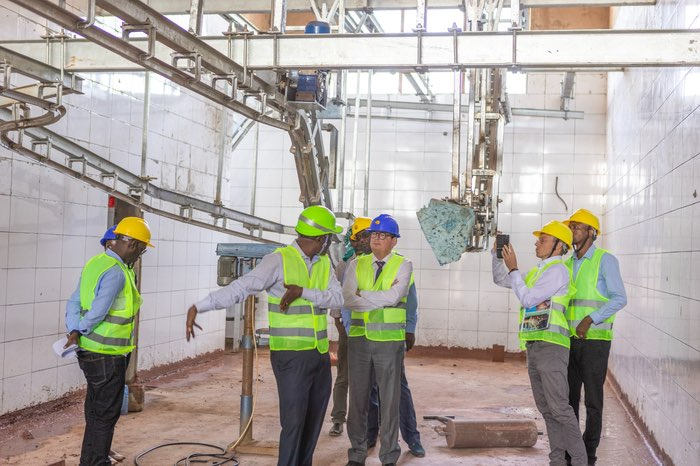
Bert Versmessen, the Belgian Ambassador to Rwanda
The Belgian Ambassador in Rwanda lauds the role played by pig farmers towards improving the quality, quantity and value chain operations in Rwanda.
The Belgian Ambassador, Bert Versmessen disclosed these during a field trip to Rusizi district, in south-western Rwanda.
The ambassador congratulated farmers, particularly the big business operators whose agricultural enterprises are likely to positively impact a big number of the community.
“This is a good project likely to employ a big number of people and increase the value chain of pig farmers. It is one of the projects we funded in the programme of agriculture whereby we fund business operators specializing in farming.”
Reflecting on the Belgian funding through its Development Agency, Enabel, in the Agricultural sector, he said, “The program is focusing on poultry and pig farming value chain but we will extend to other activities such as aquaculture, bee keeping and rabbits. We will use the value chain and extend it to other agricultural sectors including animal feeds.”
This year, the Belgian government announced additional funding to key sectors aligned with priorities of the government of Rwanda up to 2029. These key sectors are Health, Agriculture and Urbanization.
On another hand, business operators are optimistic on the high task awaiting them like satisfying the high demand of pork at home and abroad.
Jean Baptiste Mugambira, one of the pig farmers who benefited from the 345 million Euros Access to Facility, a co-financing match grant to boost funding and investment in the pig and poultry value chain.
His modern abattoir under construction is expected to slaughter at least 200 heads of cattle per day which will total to 14 tons of meat supply to different parts of the country.

He said “The technology we accessed is new and will help us in meat processing and diversification as well as employing a big number of the population.”
“Expectantly, we will employ about 200 to 500 employees in the new abattoir,” he added.
Mugambira as a business operator hopes to supply meat products to regional markets in the near future after completion of the market.
“We look forward to exporting meat both to neighboring countries including Burundi and the Democratic Republic of Congo,” He said.
The Access to Technology he accessed will enhance the quality and quantity of pork, chicken, and eggs, meeting food safety standards for domestic and export markets.
“We are dealers in meat production and our businesses are likely to employ a big number of the people from the community,” he said.
Muhanga Pig Breeding Center of Excellence which is part of agricultural and animal farming in poultry is a home to the five exotic breeds of Cambra, large white, Pietran, Camborough, Landrace and Duroc whose importation was financed by Enabel, the Belgian Development Agency.
There are seven pig breeding centers in the country, where six are privately owned; these include Muyumbu, Bugesera, Gicumbi, Kisaro, Busasamana, Rubavu and Rusizi.
Applying advance technology in transportation
Fabrice Semahoro, head of Poultry-Sub Programme at Rwanda Agricultural Board disclosed that “Almost all the breeds came from Belgium.
He revealed challenges that farmers faced in the beginning which included distribution of pig semen and how access to technology solved the problems at hand.
“We used the normal transportation means but storage of the semen was threatened. The semen would be easily destroyed but with the storage temperature of 17 temperature fahrenheit, its moderately kept.”
“The use of drones for transportation has solved the safety concerns of semen. We have trained 2,000 veterinary officers in the country and created 559 Zipline centers to be used by drones. We use the normal drone centers in the country. Anyone who is able to start artificial insemination is allowed,” he added.
Providence Manikuzwe, Project Manager, Zipline Rwanda, a logistical company based in the U.S transporting blood, said the introduction of the Zipline project has solved much regarding the transportation of semen whereby 70 doses of semen are transported per day.
The Zipline drones has so far conducted almost 1 million flights since the company’s establishment in 2021.
“It was not easy to have semen transportation on time. it is required to be transported in seven days using safe machines,” Manikuzwe noted.
There are currently 32,955 semen of pigs which has been distributed by the zipline and have been accessed by beneficiaries with success rate amounting to 87%.
Also with these Access to Technology, the quality and quantity of semen has increased, whereas before the local breeds risked dying at younger age. And now the new cross breeds can sustain the diseases and grow faster.
Enabel has provided funds to farmers to be able to buy cross breeds of 33 pigs whose semen were transported to other centers.
The new breed of pig’s are soon to be accessed by farmers with funding from NIRDA and Ministry of Agriculture funding PRISM which will solve the existing challenges of inadequate pork production in the country.
